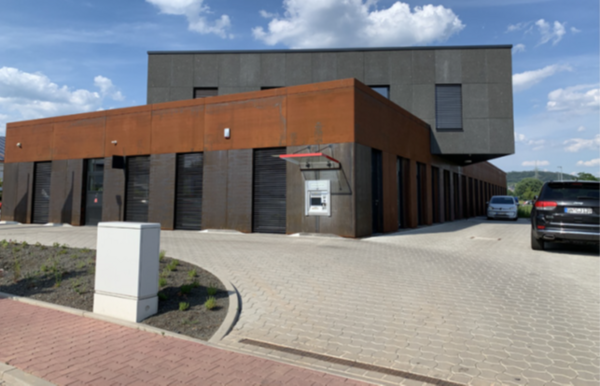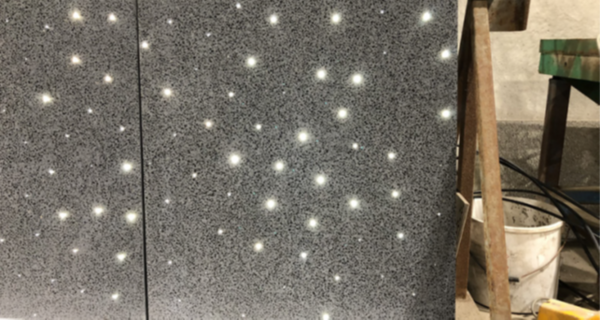FaBeR
FaBeR - Fiber and concrete recycling of carbon and textile concrete
Resource-efficient circular economy - construction and mineral material cycles (ReMin)
The use of carbon and glass fiber-reinforced concrete components has been increasing for years. However, the technical and architectural advantages are offset by the unresolved recycling of the composite building material. In the FaBeR project, a high-quality, harmless utilization of the mineral and fiber fractions of textile-reinforced concrete components to be recycled is being developed. The reuse in textile and fiber concretes is intended to keep the remaining building material stream free of fibers.
The project is being funded as part of the "Resource-efficient circular economy - construction and mineral material cycles (ReMin)" funding measure. "ReMin" is part of the BMBF research concept "Resource-efficient circular economy" and is aimed at resource-efficient construction and the expanded use of mineral secondary raw materials from construction waste, slag, ash and mining residues.
Recyclable textile concrete
Recycling technologies and recovery methods are usually only developed and implemented when large quantities of waste are produced or when an economic advantage is in the foreground. However, in terms of ecologically, economically and socially sustainable product development, it is essential to take future recycling into account.
The innovative material textile concrete has found its way into commercial practice in the last ten years and is establishing itself quickly. The waste streams are currently lower than for classic mineral waste streams. Against the background of increasing use, however, the relevance of the recycling problem is high due to the unresolved concerns regarding the fibers contained, the risk of contamination for the overall stream and the recyclable material content. Initial studies on processing have shown that the composite can be separated in principle. However, a complete solution that includes the recycling options for the recyclate fractions produced in this way is not yet available.
Versatile team - holistic approach
The FaBeR project, coordinated by the Institute for Building Materials Research at RWTH Aachen University (ibac), aims to develop a high-quality, harmless way of utilizing the mineral and fibre fractions of textile-reinforced concrete components to be recycled. When used again in the production of high-performance mineral materials, the cycle is closed.

To this end, the RWTH's Department of Mineral Resources Processing (AMR) will initially develop a treatment process. The companies Hering Bau GmbH & Co KG and Fydro Glassfibreconcrete B.V. provide production and end-of-life waste for this purpose.
The fractions generated in the AMR treatment process - expected to be fibers, coarse concrete rubble, crushed sand, mixed fraction and complete textile - will be utilized in three case studies:
1. the Mitsubishi Chemical Advanced Materials GmbH (MCAM) will process the recovered fibers for reuse as short fibers for concretes or, if possible, for other applications. The Institute of Textile Technology at RWTH (ITA) will investigate the use of the recycled fibers.
2) Holcim (Deutschland) GmbH is developing a recycled cement using the crushed sand fraction. 3. ibac is developing possibilities for using the mixed fraction. In cooperation with the company PAGEL SPEZIAL-BETON GmbH & Co. KG, a mixture for an industrial floor is being developed. Furthermore, the possibility of reuse in textile concrete is to be examined. The company Baumaschinen Beckschulte KG supports the processing of the formulation with equipment and know-how.
The ibac, the Institute for Sustainable Building at RWTH (INaB) and the Chair of Technology and Organizational Sociology at RWTH (STO) are supporting the project. The aims are to ensure occupational health and safety (ibac), an analysis of potential with a focus on emissions and economic efficiency for a life cycle assessment (INaB) and a socio-economic acceptance and cooperation assessment (STO).
In the FaBeR project, five scientific disciplines at RWTH Aachen University (textile technology, building materials, processing, sustainability assessment, sociology of technology) form a strong inter- and transdisciplinary network with two funded and four associated industrial partners from the competence fields of raw material processing/material production and processing and preparation.
Concrete results
The results of the FaBeR research project will be implemented directly in demonstrators and, following the project, in concrete products. The scientific findings will be summarized in a practical way and published as freely available guidelines for handling textile concretes.

Funding measure
Resource-efficient circular economy - construction and mineral material cycles (ReMin)
Project title
FaBeR - Fiber and concrete recycling of carbon and textile concrete, taking into account the effects of impurities on established mineral raw material cycles
Duration
01.05.2021-31.10.2023
Funding reference
033R253
Funding volume of the network
701,692 euros
Contact
Prof. Dr.-Ing. Anya Vollpracht
Institute for Building Materials Research at RWTH Aachen University
Schinkeltraße 3 | 52062 Aachen
Phone: 0241 809 5116 | Email: vollpracht@ibac.rwth-aachen.de
Project partners
Holcim GmbH; Mitsubishi Chemical Advanced Materials || Associated partners: Baumaschinen Beckschulte KG; Fydro Glassfibreconcrete B.V.; Hering Bau GmbH & Co. KG; PAGEL SPEZIAL-BETON GmbH & Co. KG
Data sheet
Download data sheet